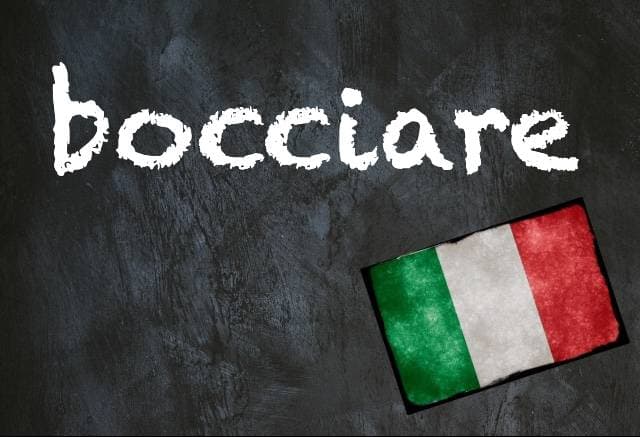Italian word of the day: 'Bocciare'

Don't reject this word without at least giving it a try.
If you open your Italian test paper to see the word bocciato sprawled across the front in big red lettering, you'd be right in assuming it's not good news.
Bocciare in Italian means to flunk, fail or to hold back.
Se non supero questo esame mi bocceranno.
If I don't pass this exam they're going to fail me.
Se continua a saltare le lezioni, verrà bocciata.
If she continues skipping classes, she's going to fail out.
And bocciatura is the practice of holding a student who's failed their end-of-year exams back a year.
Marco è stato bocciato mentre Alessia è stata promossa.
Marco was held back while Alessia moved on to the next grade.

Bocciare has other applications, however, outside the classroom. It can also more broadly mean to reject:
Era solo uno dei tanti candidati che sono stati bocciati.
He was just one of a large pool of candidates that were rejected.
And you'll often see the word appear in headlines about politics, where it usually refers to vetoing a proposal or bill.
I sindacati hanno bocciato la proposta del governo.
Labour unions rejected the government's proposal.
Il ddl è stato bocciato dalla Camera dei Deputati.
The bill was defeated in the lower house.
The verb has its origins in sport: bocciare originally meant to hit one ball with another in the popular Italian pastime of bocce, or boules.
There's been some debate as to whether bocciare can be used in the active voice by the person who failed or was rejected, as in the English 'I failed the exam', or whether it's only something that can happen to you ('I was failed/they failed me').
L'Accademia della Crusca, Italy's preeminent linguistic authority, has weighed in on this and determined that it would amount to a semantic 'absurdity' in Italian for the victim of a failure to be the author of their own failing (to fail or reject themselves, so to speak).
So while you might hear someone use a phrase like Claudio ha bocciato l'esame in a colloquial context, it's not technically considered good Italian - at least not for now.
Do you have an Italian word you’d like us to feature? If so, please email us with your suggestion.
Make sure you don't miss any of our Italian words and expressions of the day by downloading our new app (available on Apple and Android) and then selecting the Italian Word of the Day in your Notification options via the User button.
Comments
See Also
If you open your Italian test paper to see the word bocciato sprawled across the front in big red lettering, you'd be right in assuming it's not good news.
Bocciare in Italian means to flunk, fail or to hold back.
Se non supero questo esame mi bocceranno.
If I don't pass this exam they're going to fail me.
Se continua a saltare le lezioni, verrà bocciata.
If she continues skipping classes, she's going to fail out.
And bocciatura is the practice of holding a student who's failed their end-of-year exams back a year.
Marco è stato bocciato mentre Alessia è stata promossa.
Marco was held back while Alessia moved on to the next grade.

Bocciare has other applications, however, outside the classroom. It can also more broadly mean to reject:
Era solo uno dei tanti candidati che sono stati bocciati.
He was just one of a large pool of candidates that were rejected.
And you'll often see the word appear in headlines about politics, where it usually refers to vetoing a proposal or bill.
I sindacati hanno bocciato la proposta del governo.
Labour unions rejected the government's proposal.
Il ddl è stato bocciato dalla Camera dei Deputati.
The bill was defeated in the lower house.
The verb has its origins in sport: bocciare originally meant to hit one ball with another in the popular Italian pastime of bocce, or boules.
There's been some debate as to whether bocciare can be used in the active voice by the person who failed or was rejected, as in the English 'I failed the exam', or whether it's only something that can happen to you ('I was failed/they failed me').
L'Accademia della Crusca, Italy's preeminent linguistic authority, has weighed in on this and determined that it would amount to a semantic 'absurdity' in Italian for the victim of a failure to be the author of their own failing (to fail or reject themselves, so to speak).
So while you might hear someone use a phrase like Claudio ha bocciato l'esame in a colloquial context, it's not technically considered good Italian - at least not for now.
Do you have an Italian word you’d like us to feature? If so, please email us with your suggestion.
Make sure you don't miss any of our Italian words and expressions of the day by downloading our new app (available on Apple and Android) and then selecting the Italian Word of the Day in your Notification options via the User button.

Join the conversation in our comments section below. Share your own views and experience and if you have a question or suggestion for our journalists then email us at [email protected].
Please keep comments civil, constructive and on topic – and make sure to read our terms of use before getting involved.
Please log in here to leave a comment.